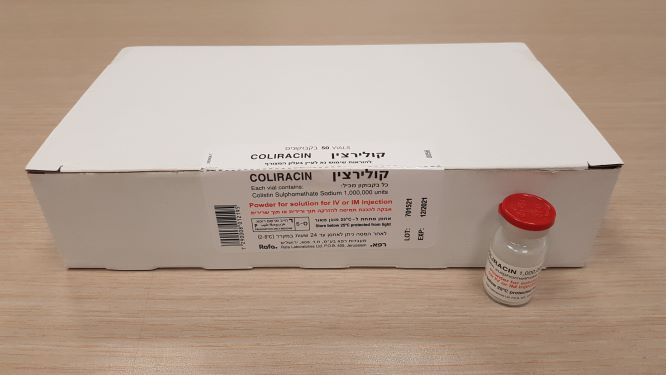Quest for the right Drug

קולירצין COLIRACIN (COLISTIMETHATE SODIUM)
תרופה במרשם
תרופה בסל
נרקוטיקה
ציטוטוקסיקה
צורת מתן:
תוך-שרירי, תוך-ורידי : I.M, I.V
צורת מינון:
אבקה להכנת תרכיז לאינפוזיה : POWDER FOR CONCENTRATE FOR INFUSION
עלון לרופא
מינוניםPosology התוויות
Indications תופעות לוואי
Adverse reactions התוויות נגד
Contraindications אינטראקציות
Interactions מינון יתר
Overdose הריון/הנקה
Pregnancy & Lactation אוכלוסיות מיוחדות
Special populations תכונות פרמקולוגיות
Pharmacological properties מידע רוקחי
Pharmaceutical particulars אזהרת שימוש
Special Warning עלון לרופא
Physicians Leaflet
Special Warning : אזהרת שימוש
4.4 Special warnings and precautions for use Consideration should be given to co-administering intravenous colistimethate sodium with another antibacterial agent whenever this is possible, taking into account the remaining susceptibilities of the pathogen(s) under treatment. As the development of resistance to intravenous colistin has been reported in particular when it is used as a monotherapy, co- administration with other antibacterial should also be considered in order to prevent the emergence of resistance. There are limited clinical data on the efficacy and safety of intravenous colistimethate sodium. The recommended doses in all subpopulations are equally based on limited data (clinical and pharmacokinetic/ pharmacodynamics data). In particular there are limited safety data for the use of high doses (> 6 MIU/day) and the use of a loading dose, and for special populations (patients with renal impairment and the paediatric population). Colistimethate sodium should only be used when other, more commonly prescribed antibiotics are not effective or not appropriate. Renal function monitoring should be performed at the start of treatment and regularly during treatment in all patients. The dose of colistimethate sodium should be adjusted according to creatinine clearance (see section 4.2). Patients who are hypovolaemic or those receiving other potentially nephrotoxic drugs are at increased risk of nephrotoxicity from colistin (see sections 4.5 and 4.8). Nephrotoxicity has been reported to be associated with cumulative dose and treatment duration in some studies. The benefit of prolonged treatment duration should be balanced against the potentially increased risk of renal toxicity. Caution is advised when administering colistimethate sodium to infants < 1 year of age as renal function is not fully mature in this age group. Further, the effect of immature renal and metabolic function on the conversion of colistimethate sodium to colistin is not known. In case of an allergic reaction, treatment with colistimethate sodium must be discontinued and appropriate measures implemented. High serum concentrations of colistimethate sodium, which may be associated with overdosage or failure to reduce the dosage in patients with renal impairment, have been reported to lead to neurotoxic effects such as facial paraesthesia, muscle weakness, vertigo, slurred speech, vasomotor instability, visual disturbances, confusion, psychosis and apnoea. Monitoring should be performed for perioral paraesthesia and paraesthesia in the extremities, which are signs of overdose (see section 4.9). Colistimethate sodium is known to reduce the presynaptic release of acetylcholine at the neuromuscular junction and should be used in patients with myasthenia gravis with the greatest caution and only if clearly needed. Respiratory arrest has been reported following intramuscular administration of colistimethate sodium. Impaired renal function increases the possibility of apnoea and neuromuscular blockade following administration of colistimethate sodium. Colistimethate sodium should be used with extreme caution in patients with porphyria. Antibiotic-associated colitis and pseudomembranous colitis have been reported with nearly all anti-bacterial agents and may occur with colistimethate sodium. They may range from mild to life-threatening in severity. It is important to consider this diagnosis in patients who develop diarrhoea during or after the use of colistimethate sodium (see section 4.8). Discontinuation of therapy and the administration of specific treatment for Clostridium difficile should be considered. Medicinal products that inhibit peristalsis should not be given. Intravenous colistimethate sodium does not cross the blood brain barrier to a clinically relevant extent.
Effects on Driving
4.7 Effects on ability to drive and use machines Neurotoxicity, characterised by dizziness, confusion or visual disturbances have been reported following parenteral administration of colistimethate sodium. If these effects occur patients should be warned against driving or operating machinery.

פרטי מסגרת הכללה בסל
א. התרופה תינתן לטיפול במקרים האלה:1. טיפול מניעתי באינהלציה בזיהומים בחולי PCD (Primary ciliary (dyskinesia עם קולוניזציה של Psuedomonas aeruginosa. 2. טיפול מניעתי באינהלציה בחולים הסובלים מברונכיאקטזות שאינן על רקע לייפת כיסתית (CF) שחוו לפחות שתי החרפות של ברונכיאקטזיות שהצריכו טיפול אנטיביוטי בשנה האחרונה, והם בעלי תרבית חיובית ל- Psuedomonas aeruginosa לאחר טיפול ארדיקציה באנטיביוטיקה סיסטמית נגד חיידק זה.ב. מתן התרופה ייעשה לפי מרשם של מומחה ברפואת ריאות או רפואת ריאות ילדים או מחלות זיהומיות
מסגרת הכללה בסל
התוויות הכלולות במסגרת הסל
| התוויה | תאריך הכללה | תחום קליני | Class Effect | מצב מחלה |
|---|---|---|---|---|
| טיפול מניעתי באינהלציה בזיהומים בחולי PCD (Primary ciliary (dyskinesia עם קולוניזציה של Psuedomonas aeruginosa. | ||||
| יפול מניעתי באינהלציה בחולים הסובלים מברונכיאקטזות שאינן על רקע לייפת כיסתית (CF) |
שימוש לפי פנקס קופ''ח כללית 1994
לא צוין
תאריך הכללה מקורי בסל
21/01/2016
הגבלות
תרופה מוגבלת לרישום ע'י רופא מומחה או הגבלה אחרת
מידע נוסף
